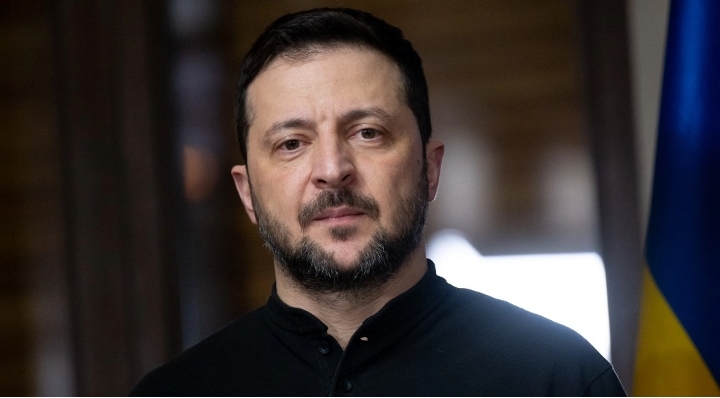NEWS
Just in :”War Must Return Where It Came From” – Zelensky Confirms Ukrainian Troops in Russia’s Belgorod…Read More

Just in :”War Must Return Where It Came From” – Zelensky Confirms Ukrainian Troops in Russia’s Belgorod…Read More
On April 7, 2025, Ukrainian President Volodymyr Zelensky made a bold and significant announcement that reverberated across the international stage: Ukrainian troops are actively operating in Russia’s Belgorod region, marking a notable escalation in the ongoing conflict between Ukraine and Russia. In a video address, Zelensky confirmed that his top military commander, Oleksandr Syrskyi, had briefed him on operations not only along the front lines and in the Kursk region—where Ukrainian forces have held territory since August 2024—but also in Belgorod, a second Russian border region. His statement, “War must return to where it came from,” encapsulates Ukraine’s strategic shift toward bringing the fight onto Russian soil, a move that has profound implications for the war’s trajectory, regional stability, and global geopolitics.
Background: A War Spilling Across Borders
The Russia-Ukraine war, which began with Russia’s full-scale invasion of Ukraine in February 2022, has largely been fought on Ukrainian territory, with devastating consequences for its people, infrastructure, and economy. However, in recent months, Ukraine has adopted a more aggressive posture, launching incursions into Russian territory as a means of disrupting Moscow’s military operations and shifting the psychological dynamics of the conflict. The most prominent of these efforts has been Ukraine’s occupation of a small strip of land in Russia’s Kursk region since August 2024, an operation that caught many observers by surprise and demonstrated Kyiv’s willingness to take risks.
The confirmation of Ukrainian troop presence in Belgorod, a region just 30 miles from Ukraine’s second-largest city, Kharkiv, adds a new layer to this strategy. Belgorod Oblast, located northeast of Ukraine, has historically served as a staging ground for Russian military operations targeting Ukrainian border areas, including Kharkiv and Sumy. By crossing into Belgorod, Ukraine aims to disrupt Russian supply lines, reduce pressure on its own eastern front, and send a clear message: the war will not remain a one-sided affair confined to Ukrainian soil.
Zelensky’s Rationale: Defense Through Offense
In his address, Zelensky emphasized that the primary objective of these cross-border operations remains the defense of Ukrainian territory and its people. “Our presence in the Kursk and Belgorod regions… is absolutely right,” he stated, framing the incursions as a necessary response to Russia’s relentless aggression. He highlighted the strategic benefits of the Kursk operation, noting that it has alleviated pressure on other critical fronts, particularly in the Donetsk region, where Russian forces have been making slow but steady gains.
The phrase “war must return to where it came from” is both a rhetorical flourish and a strategic declaration. Zelensky’s argument is rooted in the idea that Russia, as the aggressor, should not be immune to the consequences of its actions. By targeting border regions like Belgorod, Ukraine seeks to force Moscow to divert resources to defend its own territory, thereby weakening its offensive capabilities in Ukraine. This approach also carries a psychological dimension, aiming to unsettle Russian civilians and leadership by bringing the conflict home.

Reports of Ukrainian military activity in Belgorod first surfaced in March 2025, when Russian military bloggers claimed that Ukrainian troops had crossed the border. While those initial reports were unconfirmed at the time, Zelensky’s statement on April 7 lends credence to the notion that Ukraine has been quietly expanding its operations beyond Kursk. The 225th Assault Regiment, praised by Zelensky in his address, appears to be among the units involved, underscoring the professionalism and determination of Ukraine’s fighting force.
The Belgorod Incursion: What We Know
Details about the scope and scale of Ukrainian operations in Belgorod remain limited, as both sides maintain tight control over information. However, Zelensky’s confirmation aligns with earlier accounts from Russian sources and independent analysts. In late March, Reuters reported that Ukrainian forces had advanced 3-4 kilometers into Belgorod, breaking through the first line of Russian defenses near the village of Popovka. Heavy fighting was said to be ongoing, though the extent of Ukraine’s territorial gains—if any—remains unclear.
Belgorod’s proximity to Kharkiv makes it a logical target for Ukrainian forces. The region has been a launchpad for Russian artillery and missile strikes on Ukrainian cities, and its border areas have hosted military bases and logistics hubs critical to Moscow’s war effort. By establishing a presence in Belgorod, Ukraine could disrupt these operations, create a buffer zone to protect its northeastern cities, and potentially use the territory as leverage in future negotiations.
The incursion also builds on the precedent set in Kursk, where Ukraine has maintained control over a small area despite Russian counteroffensives. Zelensky noted that the Kursk operation has achieved its goal of reducing pressure on other fronts, suggesting that the Belgorod campaign may pursue similar objectives. Whether Ukraine intends to hold ground in Belgorod long-term or conduct hit-and-run operations remains an open question, but the move signals a shift toward a more proactive and offensive strategy.
Domestic and International Reactions
Within Ukraine, Zelensky’s announcement has been met with a mix of pride and cautious optimism. The idea of “returning the war” to Russia resonates with a population weary of constant bombardment and displacement. Social media posts from Ukrainian supporters have praised the bravery of the troops involved, with some calling it a turning point in the conflict. However, the risks of escalation and Russian retaliation loom large, tempering enthusiasm with concern.
Internationally, the response has been more nuanced. NATO leaders, meeting around the same time as Zelensky’s address, faced renewed calls from Kyiv to increase pressure on Russia. British Foreign Secretary David Lammy condemned Russia’s ongoing attacks on Ukrainian civilians and infrastructure, but Western allies have stopped short of explicitly endorsing Ukraine’s cross-border operations. The use of NATO-supplied weapons in Russian territory remains a contentious issue, with some critics arguing that it risks drawing the alliance deeper into the conflict—a charge Moscow has repeatedly leveled.
Russia, for its part, has portrayed Ukraine’s actions as acts of terrorism. Kremlin-aligned voices have accused Kyiv of targeting civilians, though evidence of such claims remains anecdotal. Russian military bloggers and officials have acknowledged Ukrainian activity in Belgorod but downplayed its significance, framing it as a desperate move by a faltering Ukrainian army. Nonetheless, the incursion is likely to intensify Russia’s efforts to fortify its border regions and retaliate against Ukrainian cities.
Strategic Implications and Future Prospects
The confirmation of Ukrainian troops in Belgorod raises critical questions about the war’s future. For Ukraine, the operation is a high-stakes gamble. Success could bolster morale, disrupt Russian logistics, and strengthen Kyiv’s position in potential peace talks. Failure, however, could overextend Ukrainian forces, invite devastating reprisals, and strain relations with Western backers wary of escalation.
For Russia, the incursion challenges the narrative of invincibility that President Vladimir Putin has sought to project. Defending Belgorod and Kursk diverts resources from the eastern front, where Moscow has prioritized capturing the Donbas. It also exposes vulnerabilities in Russia’s border defenses, potentially fueling domestic discontent as the war encroaches on its own citizens.
Globally, the development underscores the conflict’s potential to spill beyond Ukraine’s borders, testing the resolve of NATO and other international actors. Zelensky’s push to ramp up domestic drone production—including long-range and electronic warfare-resistant models—suggests that Ukraine is preparing for a prolonged struggle, one in which territorial incursions may become a regular feature.
Conclusion: A New Phase of the War
Zelensky’s confirmation of Ukrainian troops in Belgorod marks a pivotal moment in the Russia-Ukraine war. By declaring that “war must return to where it came from,” he has signaled Ukraine’s intent to redefine the battlefield, forcing Russia to confront the consequences of its aggression on its own soil. While the immediate outcomes of the Belgorod operation remain uncertain, its symbolic and strategic weight is undeniable. As the conflict enters this new phase, the world watches closely, aware that the stakes—for Ukraine, Russia, and the broader international order—have never been higher.












